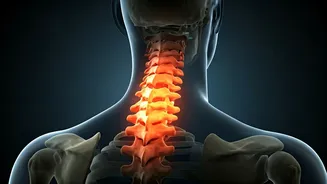Poor Posture Prolonged
Extended periods of sitting and maintaining incorrect posture are significant contributors to spinal issues. The modern lifestyle, characterized by desk
jobs and screen time, often encourages this harmful habit. When sitting for long stretches, the spine bears substantial pressure, leading to potential disc compression and muscle strain. Poor posture further exacerbates the problem. Slouching or hunching while seated misaligns the spine, adding extra stress to specific areas and possibly causing long-term discomfort and even chronic back pain. To mitigate these adverse effects, it's crucial to incorporate regular breaks and maintain a posture that supports the natural curvature of the spine. Ergonomic chairs and mindful attention to body positioning are invaluable in protecting your spine from such harm.
Phone Overuse's Impact
Excessive smartphone use is a prevalent issue in modern society, often leading to spinal problems. Continuously looking down at a phone places considerable strain on the neck muscles and cervical spine. This posture forces the head to lean forward, increasing the weight the neck supports. Over time, this posture can cause neck pain, stiffness, and potential misalignment of the spinal vertebrae. It can also contribute to headaches and nerve compression. To lessen the adverse effects, consciously maintain a neutral head position while using your phone. Regularly take breaks from screen time to stretch the neck and shoulders, preventing muscle strain. Furthermore, use techniques like holding the phone at eye level to ensure a straighter posture and minimize the neck's forward tilt.
Sedentary Lifestyle Risks
A sedentary lifestyle poses significant challenges to spinal health. A lack of physical activity can lead to weaker core muscles, which are essential for supporting the spine. When core muscles are weak, the spine is more vulnerable to injury and instability. Moreover, prolonged inactivity contributes to weight gain, increasing the burden on the spine. Limited movement also decreases the flexibility of spinal discs, making them more prone to degeneration. Incorporating regular physical activity, such as exercises that strengthen the back and core muscles, and activities like walking or swimming, can counteract the negative effects of a sedentary routine. Integrating short bursts of activity into your day, like taking walking breaks or doing stretches, supports spinal health and overall wellness.
Avoid Bad Mattresses
Using a defective mattress significantly impacts spinal health and sleep quality. A mattress that lacks proper support can fail to maintain the spine's natural alignment during sleep. This may lead to unnecessary pressure on the spinal discs and joints. Mattresses that are too soft might cause the body to sink, promoting an unnatural spinal curve. Conversely, mattresses that are too firm may not contour to the body properly, causing pressure points that can lead to discomfort. To prevent these problems, select a mattress that offers adequate support while conforming to the body's shape. Consider mattresses with features like memory foam or pocketed coils, designed to support the spine and facilitate correct alignment. If your mattress is old or showing signs of wear, replacing it is essential for maintaining a healthy spine and promoting restful sleep.
Stomach Sleeping Problems
Sleeping on your stomach can be particularly damaging to spinal health. This position typically requires the neck to be twisted to the side for an extended period, causing strain on the cervical spine. This rotation can lead to muscle stiffness, neck pain, and potential misalignment of the vertebrae. Moreover, stomach sleeping flattens the natural curvature of the spine, putting extra pressure on the lower back. Over time, this can result in discomfort and possibly more serious issues. If you are a stomach sleeper, consider transitioning to a side or back sleeping position. Supporting your spine with a well-chosen pillow, like a contoured pillow, or placing a pillow beneath your knees when sleeping on your back, can help maintain proper alignment and alleviate spinal strain.













